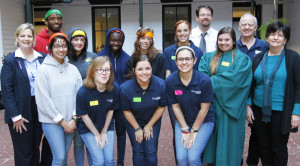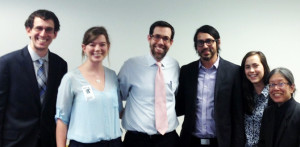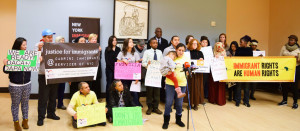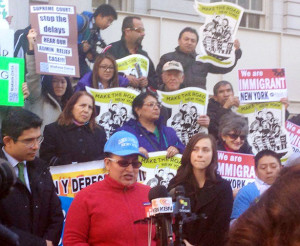
Cabrini College and High School CRS Immigration Simulation
3.22.16
Photo: Tyler Kaufman/©2016
Cabrini High School (CHS) participated in the “Unaccompanied Minors: Refugees Seeking Safety” simulation developed by Cabrini College Catholic Relief Services (CRS) Ambassadors to increase understanding and awareness of the plight of unaccompanied minors fleeing South and Central American countries.
CHS Juniors participated in the simulation to increase their understanding of the plight of unaccompanied minors fleeing Central and South American countries. The program was created and implemented by Cabrini College CRS Student Ambassadors who visited from Radnor, PA. As part of the Cabrini College CRS goals and a course on the Common Good, the college students designed a simulation focusing on the specific immigration issue of the many unassisted children seeking refuge and safety in the U.S.
Cabrini College was the first college campus to establish a partnership with CRS, and Cabrini High School, a select Platinum Level Global CRS High School, is the first group of high school students chosen to participate in the program. The simulation began during the welcoming dinner, as the two CRS programs empowered one another to work together on a common Cabrinian goal: increasing awareness of the need for immigration reform.
Cabrini College’s Communications Professor Dr. Jerry Zurek and Dr. Ray Ward, Associate Director of Peace and Justice, initiated the simulation by remembering Mother Cabrini, the Patron Saint of Immigrants, and her work with immigrants, orphans and the marginalized during the time she spent in the United States. Mother Cabrini’s ministry in New Orleans was spent primarily serving the needs of many Italian immigrant children at the orphanage on St. Philip Street. The Missionary Sisters of the Sacred Heart continue to advocate for immigration reform as one of their two corporate stances.
The simulation included a complex map of the various routes to citizenship, and scenarios tracing the process leading to legalized citizenship to determine typical lengths of processing time, qualifications, costs, and the chance of deportation. Each student was assigned a simulated journey assuming the “role” of unaccompanied minor, and traveled through the stages of gang harassment, the court system, and detention center. Throughout the simulation, the college students explained the hazards of that stage of the journey, with the whole group sharing their reactions along the way.
Advocacy was addressed during the final stage of the simulation, suggesting strategies the students could use to influence legislation, such as write to senators, representatives, and the president.
Cabrini College provided pre-printed letters requesting government leaders to:
- Stop deportation of minors back to dangerous home countries.
- Provide lawyers and translators for minors when they are in legal proceedings.
- Fund vocational training for teens in Central America.
Many students chose to formally participate, including handwritten notes with their pre-printed letters.





 As New York State prepares its budget for 2017, members of Cabrini Immigrant Services have been reaching out to representatives to tell them the necessity of supporting services for immigrants. Last week we met with State Senator Daniel Squadron to talk about the New York State Dream Act, funding for legal services and classes for English for Speakers of Other Languages (ESOL), and the need for better translation and interpretation services at hospitals and schools. We hope that he and other elected officials hear us as we continue to advocate for our immigrant community
As New York State prepares its budget for 2017, members of Cabrini Immigrant Services have been reaching out to representatives to tell them the necessity of supporting services for immigrants. Last week we met with State Senator Daniel Squadron to talk about the New York State Dream Act, funding for legal services and classes for English for Speakers of Other Languages (ESOL), and the need for better translation and interpretation services at hospitals and schools. We hope that he and other elected officials hear us as we continue to advocate for our immigrant community

 On Tuesday, February 23, members of the Justice for Immigrants campaign at Cabrini Immigrant Services participated in an action asking President Obama to stop the raids of Central American refugees. Right after Christmas, Immigration and Customs Enforcement (ICE) began a spree of arresting and deporting refugees from Central America who came to the United States fleeing violence. Of all the people who have been deported since 2014, we know at least 83 have been killed in their home countries.
On Tuesday, February 23, members of the Justice for Immigrants campaign at Cabrini Immigrant Services participated in an action asking President Obama to stop the raids of Central American refugees. Right after Christmas, Immigration and Customs Enforcement (ICE) began a spree of arresting and deporting refugees from Central America who came to the United States fleeing violence. Of all the people who have been deported since 2014, we know at least 83 have been killed in their home countries.


